Episodes
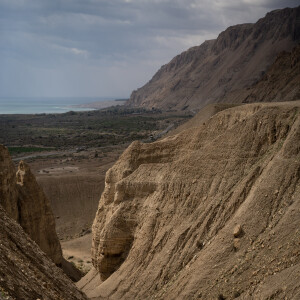
Friday Apr 25, 2025
The Theology of the Dead Sea scrolls - Introduction
Friday Apr 25, 2025
Friday Apr 25, 2025
In this episode you will learn about:
The Dead Sea Scrolls, discovered between 1947 in the caves of Qumran near the Dead Sea, are considered the greatest archaeological discovery of the 20th century. They contain over 900 manuscripts, offering profound insights into Jewish life and scriptural interpretation during the Second Temple period.
The scrolls are attributed to a Jewish sect most likely the Essenes who withdrew from Jerusalem in protest against what they saw as a corrupt priesthood. They settled at Qumran, living in purity and waiting for the apocalyptic end of days. The discovery included stone vessels, ritual baths (mikvaot), and a scriptorium, all indicating a monastic, religious lifestyle deeply rooted in Scripture. There are three important historians that wrote about them:
Philo of Alexandria, Josephus flavious and Pliny the Elder.
Philo of Alexandria mentions that the essenes live in villages, not cities, to avoid moral corruption. They renounce wealth and personal property, living communally, they devote themselves to peace, agriculture, and virtue, rejecting war and slavery.
Josephus flavius had the most information about the essenes, they reject pleasures, value virtue, and live communally without private property, they avoid marriage, live simply, and emphasize purity and ritual cleanliness, they follow strict discipline, practice daily prayers, and eat in sacred silence and their souls are believed to be immortal, and they view the body as a temporary prison.
While Pliny the elder wrote only about the geographical location in his Natural history book and he says that the Essenes live near the Dead Sea, avoiding cities and women, they have no money, only palm trees and simplicity. Not much in details.
Three Categories of Scrolls
- Biblical Canonical Texts: These are the oldest known Hebrew Bible manuscripts, predating the Masoretic Text our primary Hebrew Bible source by over 1,000 years. Every book of the Hebrew Bible was found—except Esther.
- Apocryphal and Pseudepigraphal Texts: These include works like 1 Enoch and the Book of Jubilees—books that were influential in early Judaism and Christianity, even if not canonized.
- Sectarian Texts: Unique to Qumran, these writings detail community life, beliefs, and regulations, including the Community Rule, War Scroll, and Thanksgiving Hymns. They reveal a society organized around purity, hierarchy, and eschatological expectation.
For the complete Video online course check our website:
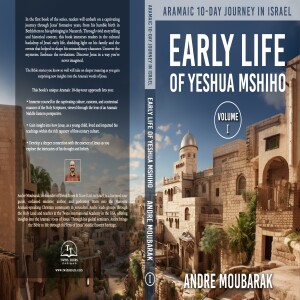
Monday Apr 28, 2025
5 stars Amazon Review
Monday Apr 28, 2025
Monday Apr 28, 2025
Shlama Friends!
I'm so excited to announce that my new book Aramaic 10-Day Journey in Israel is now available on Amazon!
If this book touched your heart or opened your eyes to the treasures of Aramaic faith and culture, would you bless me by leaving a 5-star review?
Here’s how you can help me step-by-step (and it will only take a minute
Step 1: Click this link:
Step 2: Sign in to your Amazon account if you're not already logged in.
Step 3:
Choose the 5 Stars rating.
Write a few words — maybe what you enjoyed most about the journey!
(Example: "This book brought the Aramaic world to life! A must-read for Bible lovers!")
Step 4: Click Submit — and you're done!
Your review makes a HUGE difference! It helps more readers discover the beauty of our ancient faith and supports my future work .
Here’s the direct Amazon link to the book if you want to share it too:
Aramaic 10-Day Journey in Israel
Thank you so much for walking this journey with me!
Together, we are restoring the voice of the East.
www.twinsbiblicalacademy.com/shop
With gratitude and blessings,
Andre Moubarak

Saturday May 03, 2025
Divine Power in Human Weakness
Saturday May 03, 2025
Saturday May 03, 2025
In the Aramaic idiom, weakness (ܟܘܪܗܢܐ, kūrḥānā) is not simply about physical or emotional frailty, but often symbolizes the place where human capacity ends and divine intervention begins. The cross—zqīpā ܙܩܝܦܐ—would be seen as the ultimate shameful death, yet Paul redefines it as the seat of ܚܝܠܐ ܕܐܠܗܐ (ḥaylā d'Alāhā), “God’s power.”
In the Semitic worldview, paradox is often embraced—a suffering servant can be victorious, a crucified one can be king. Paul, thinking in Aramaic, is expressing a mystical truth: God reverses expectations. What the world mocks as weakness, God exalts as strength.
-
The phrase “the word of the cross” (ܡܠܬܐ ܕܙܩܝܦܐ, meltā d'zeqīpā) is folly (ܫܛܝܘܬܐ, shaṭyūtā) to Greeks, but salvation (ܦܘܪܩܢܐ, pūrqānā) to those who believe.
-
Paul’s logic echoes Hebrew prophetic tradition, where God lifts the lowly (cf. Isaiah 53).
-
Divine power manifests not in domination, but in kenosis—emptying, humility, and suffering.
Key Insight:
Paul is not introducing a new theology but is drawing from Aramaic-Jewish roots: the God of Israel reveals His might not through empire, but through the broken body of the Messiah. In Aramaic thinking, this is not contradiction—it is divine mystery.
For more in depth studies check our online courses:
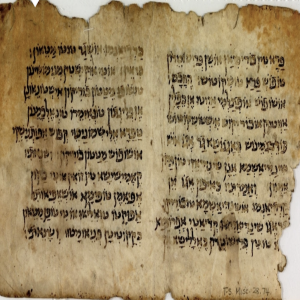
Friday May 09, 2025
The Role and impact of the Septuagint Translation on Early Christianity
Friday May 09, 2025
Friday May 09, 2025
The Septuagint, the earliest Greek translation of the Hebrew Bible, serves as a vital link between Judaism and Christianity. In this presentation, we will explore its origins, significance, and The Beginnings of the Septuagint Translation and Its Significance for Diaspora Judaism and its role on early Christianity.
For more in depth lessons about Second Temple Judaism check our online Academy

Saturday May 17, 2025
Twins Tours Israel - Buisness Plan
Saturday May 17, 2025
Saturday May 17, 2025
Join the Vision. Walk the Land. Impact Lives.
Be part of the Twins Tours business plan in Israel — where faith, history, and purpose unite. Together, we’re not just leading tours… we're building a movement that brings the Bible to life through the land of its origins.
🌍✡️ Let’s walk the land and transform hearts — one journey at a time.
Partner with purpose. Invest in meaning.
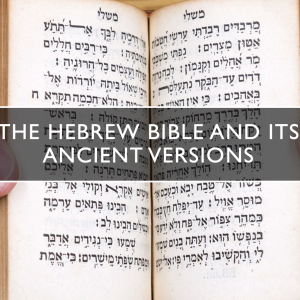
Sunday Jun 15, 2025
✨The Hebrew Bible and Its Ancient Versions✨
Sunday Jun 15, 2025
Sunday Jun 15, 2025
✨ The Hebrew Bible and Its Ancient Versions ✨
Discover the rich tapestry of sacred scripture as it was read, heard, and lived across centuries. From the original Hebrew scrolls to the Aramaic Targums, the Greek Septuagint, and the Syriac Peshitta—each version reveals a unique layer of divine revelation.
📜 Join us at Twins Biblical Academy and deepen your understanding of the Bible through its ancient languages and traditions.
➡️ Enroll now in our online courses at: www.twinsbiblicalacademy.com
Your journey into the world of biblical languages begins here!
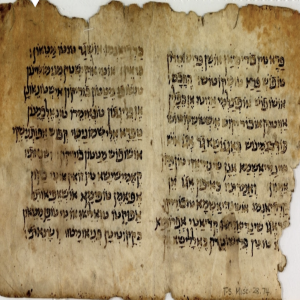
Sunday Jun 29, 2025
The Dead Sea Scrolls Part I - Aramaic Targum
Sunday Jun 29, 2025
Sunday Jun 29, 2025
As a teacher and guide to the Bible in its original Middle Eastern setting, I want to invite you into a deeper experience of Scripture one that bridges the Jewish world of Jesus with our world today.
Many believers have heard of the Targum, but few truly know what it is.
🔹 Did you know that the Targum is how most Jews in Jesus’ time first heard the Bible?
🔹 Did you know it doesn’t just translate the Hebrew — it interprets, expands, and even whispers Messianic hopes through Aramaic eyes?
Join me for a live webinar where I will take you into the world of the Targum:
-
Why it matters for your understanding of the Gospels
-
How the early Church Fathers viewed it
-
What Aramaic phrases Yeshua used that echo Targumic traditions
For more indepth teachings check our online Academy: www.twinsbiblicalacademy.com
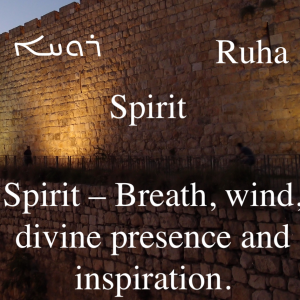
Thursday Jul 03, 2025
Aramaic Word of the Day - Ruha
Thursday Jul 03, 2025
Thursday Jul 03, 2025
Welcome to season eleven Aramaic Word of the day
As an Israeli guide who’s spent years walking the dusty roads of ancient Galilee and praying beneath the arches of many monasteries, I often pause when I hear Western believers speak of the "Holy Spirit." They say Spirit, and I nod but my heart whispers: Ruḥa
You see, in the Aramaic world of Jesus, Ruḥa isn’t just “spirit” the way the Western, Indo-European mind understands it as something abstract, immaterial, or metaphorical. In the West, shaped by Greek dualism and Enlightenment rationalism, “spirit” is often divorced from breath, body, and movement. It becomes a concept something to analyze, categorize, and sometimes, to doubt.
But in the Semitic world — in Aramaic — Ruḥa is breath. It is wind. It is life itself.
Ruḥa comes from the verb (raḥ) to blow, to exhale, to cause movement. Every time someone in ancient Israel said Ruḥa, they were speaking of something felt the stirring of a breeze across your skin, the warm exhale of a mother over her newborn child, the final sigh of a man at death, and the first gasp of a baby at birth
in the Aramaic mindset, Ruḥa is never separated from action. It’s not a distant, ethereal presence it is the invisible that moves the visible. Like the wind over the Sea of Galilee, it cannot be seen, but its power is always known by what it stirs.
Now compare this with the Western idea. In Indo-European thought take Latin spiritus, or Greek pneuma we begin to move toward abstraction. Spiritus is elevated, intellectual, something more philosophical than personal. The body is often seen as separate or even lesser. But in Semitic thinking, and especially in Aramaic, there is no separation between the breath of God and the life of a human. The two are intertwined. God's Ruḥa animates us moment by moment.
That’s why when Yeshua breathed on His disciples in John 20:22 — “And he breathed on them and said, Receive the Holy Spirit” the Aramaic understanding is not metaphorical. It is literal. The breath of the risen one is the Spirit. He didn’t give them a “doctrine of pneumatology.” He gave them His Ruḥa His presence, power, and nearness in breath.
Let me tell you something I’ve learned from standing in the prayer caves of the Judean desert in Qumran. If you quiet your soul enough, you can feel the Ruḥa there not because it’s emotional, but because it’s reeal. The Aramaic word doesn’t ask, “What is the Spirit?” It asks, “Where is the Spirit blowing?” And that question implies a sacred responsibility: to move with it.
Reflect and Breathe My question for you, my friend:Are you walking with the Spirit like an idea, or like a breath? Are you analyzing God or inhaling Him?
My hope is that as you learn the language of Jesus, you learn to breathe again with Him. Slowly. Deeply. Without rush.
Because Ruha is already within you.
All you have to do is listen for the wind.
That was the Aramaic word of the Day, for more in depth Aramaic words check our website www.twinsbiblicalacademy.com
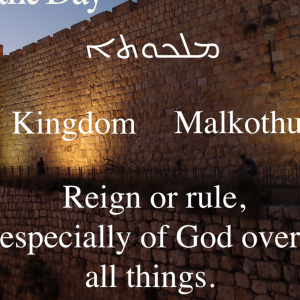
Friday Jul 04, 2025
Aramaic word of the Day - Malkutha
Friday Jul 04, 2025
Friday Jul 04, 2025
Welcome to season eleven Aramaic Word of the day: Malkutha — Kingdom
As your guide through the streets of Jerusalem, I don’t just point out ruins. Show only churches and archeological sites. I help people to remember the world Yeshua walked, the language He spoke, and the Kingdom He proclaimed.
And today, I want to walk you into one of His most powerful words:
Malkutha — Kingdom.
In Aramaic, Malkutha doesn’t just mean a realm or a place. It’s the reign of Goaad made visible not in walls or palaces, but in the way we live, love, and listen.
When Yeshua stood on the Mount of Olives, just behind me, looking toward the Temple, He wasn’t dreaming of taking back political control. He wasn’t interested in a crown of gold.He was revealing a different kind of kingdom one that starts within you, not on top of the mountain.
Again when I guide pilgrims from the West specially on the mount of olives and when i speak about the kingdom of God and the temple mount and his reign, I often see this difference unfold before my eyes.
The Western mind wants structure. It wants to define the Kingdom where is it? Who’s in charge? What’s the system? It thinks like Rome: build it, measure it, enforce it.
But here in the East in the Semitic world of the Bible we don’t define the Kingdom, we experience it.
I have questions from the pilgrims from the West: “Where is the Kingdom?”In Jerusalem: “Who is the King and is He welcome at your table?” They want answers Now they want to understand and have fact.
Also in the West: “What are the boundaries?”In the East: “What is the relationship?”
Then i answer them from scripture
That’s why in Luke 17:21, Yeshua says:
"The Kingdom of God does not come with observation... behold, the Kingdom of God is within you."
He was speaking like a Galilean rabbi, not a Greek philosopher.He was drawing from the well of intimacy, not institution.
Then i give them this example
As a guide, my life is not about showing people pretty views, it is about bearing witness to the Kingdom in action. When I walk the Via Dolorosa with guests. When I lead prayers in the Garden of Gethsemane. When I share bread with strangers at the Damascus Gate.
That’s Malkutha the Kingdom becoming flesh again in us.
It’s not something we wait for. It’s something we live. And we either reveal it or resist it by how we treat the poor, the enemy, the orphan, and yes, the tourist too.
So today, my friend, whisper the word: Malkutha. Let it roll gently from your tongue like olive oil from a press.
And ask yourself:
“Is the King just a belief in my head? Or is He reigning through my hospitality, my forgiveness, my courage, my joy?”
Here in Jerusalem, we don’t ask where is the Kingdom? We ask: Are you letting it break in, like light through an ancient window? from your home from your heart.
Yeshua’s kingdom is not far it is as close as your next act of love. it is inside you, you do not need to search for it outside or in Jerusalem or in the temple or in any place. It is you! i pray that you are encouraged today and the Aramaic word of the day touched your heart.
For more in depth teaching www.twinsbiblicalacademy.com
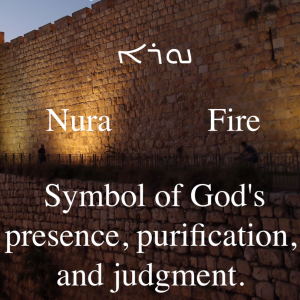
Saturday Jul 05, 2025
Aramaic word of the Day - Nura
Saturday Jul 05, 2025
Saturday Jul 05, 2025
Welcome to season eleven Aramaic Word of the day: Noura — Fire.
As a Middle Eastern guide shaped by the ancient stones of Jerusalem, I often stand by a campfire in the Judean hills and watch the flames dance alive, unpredictable, and warm. That fire, in Aramaic, is Noura. But it is not just physical heat or chemical reaction. No In our world the Semitic world Noura is presence. It is life, purification, judgment, revelation, and divine encounter.
Noura as Manifestation
In the Bible, Noura is how God appears not in abstraction, but in relational intensity. Think of Exodus 3: “The bush was burning with fire but it was not consumed.” Noura is theophany - God made visible.
But Western thinking? It reduces fire to a thing. An element. A force to be studied, measured, and controlled. Fire in science labs. Heat on thermostats. A survival tool.
In our world, fire is not tamed it is encountered.
Noura as Purification
In Semitic thought, Noura purifies. Daniel’s friends in the furnace (Daniel 3) weren’t burned they were cleansed. Fire revealed their faith and the presence of the divine Fourth Man walking with them. Fire is not punishment; it is refinement.
Western theology often frames fire as hellfire, destruction, and fear. “You will burn if you fail.” But the Aramaic heart sees Noura as the flame that refines gold, not the one that destroys straw.
Fire tests. It does not torment. It reveals.
Noura and Light
The root of Noura is also tied to light. The fire of God gives vision. In Psalm 119, the word is a lamp to my feet that’s Noura guiding the soul through darkness. In Western thought, light is often symbolic of knowledge illumination of the mind. Think Enlightenment, progress, reason.
But in our Semitic walk, light is relational clarity, not just cognitive. It's how you see God, not just how you learn facts.
In Aramaic, to have Noura is not to know more it’s to walk closely.
Noura in the Heart
When the disciples walked with Yeshua on the road to Emmaus, they said: “Did not our hearts burn within us?” (Luke 24:32). That is Noura not intellectual persuasion but heart ignition. A Middle Eastern man does not say, “I agree with your argument.” He says, “My heart burns.” That’s how we know truth—by inner fire.
In contrast, Western thought often seeks truth through cold logic and philosophical systems. But our ancestors knew: if the truth does not burn, it is not yet alive.
My brother, my sister have you experienced Noura? Not just the warmth of emotion, but the fire that reveals, refines, and invites you closer?
Ask yourself:
Is the Word just ink on a page, or is it fire in your bones?
Is your theology cold, or does it set hearts ablaze?
My hope is this:That you no longer fear fire, but welcome it.That the presence of Noura in your life would not consume you,but illuminate the face of the One who walks beside you in the furnace. Please always remember that the fire of God is not against you. It is for you.
Come closer to the fire in your heart.
For more in depth studies check our website: www.twinsbiblicalacademy.com

